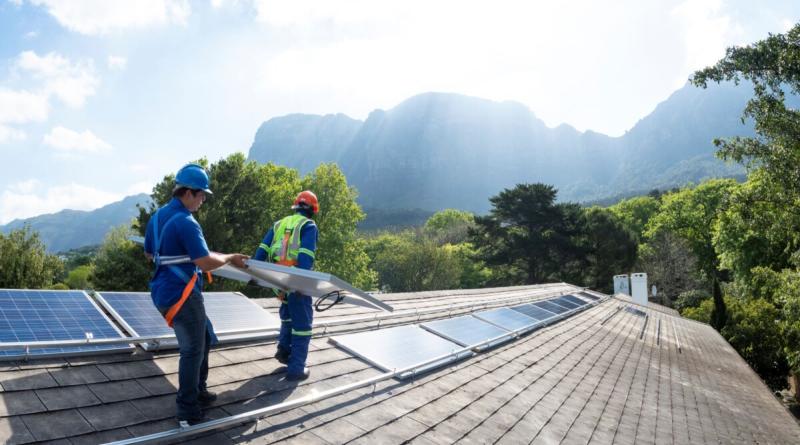Decolonise to decarbonise

The Reverend Dr Martin Luther King Jr once said, in the context of the civil rights movement in the US, “I have no time for the tranquillising drug of gradualism”. He was a radical, not just in the political sense of the term but in the literal sense, meaning we need to go to the roots of the problem – that’s what ‘radical’ means. Because if we’re not radicals, then we’re operating at the surface, and that means superficial solutions, the status quo. So we need to identify the roots of the problem.
In the context of the global south, the problem today is once again external debt. That is what eats into fiscal policy space, it is what doesn’t allow us to invest in critical priorities such as health, education, and climate action. However, external debt is a symptom of three major structural issues that must be addressed if we’re going to move forward with a just transition in the global south: energy deficits, food deficits and manufacturing value-added deficits. And each of these have colonial and post-colonial roots.
First, when we speak of energy deficits, it includes our biggest oil exporter in Africa: Nigeria, which imports 100% of its gasoline today; gasoline that’s actually illegal to sell in Europe. This is not by accident, it’s by design. Angola, the second largest exporter of oil, imports 80% of its fuel from international markets. Mexico imports 50% of its fuel from the United States. This is by design.
Second, when it comes to food deficits, Africa today imports 85% of its food, when less than a hundred years ago we used to be the breadbasket for colonial powers. Again, this is not by accident, it’s by design. What is the design? It’s the rules of international trade, such as agricultural subsidies in the global north.
As soon as the African continent started to gain independence in the 1950s, European leaders met at the Treaty of Rome meeting and essentially acknowledged that Europe had a food security problem: it was too dependent on the colonies that were becoming independent. So Europe needed to introduce its own food sovereignty program, which came into effect in 1962 when the Common Agricultural Policy (CAP) was launched. CAP remains a foundational block of the European Union to this day.
It wasn’t just Europe of course, it was also the US, Canada, Australia, and the former Soviet Union – which is why Russia and Ukraine still dominate the grain industry. The way these countries protected their agricultural industries forced the global south, Africa
in particular, to give up producing wheat, corn, barley and the core crops we need for our actual food security. Instead, we were forced to play a new role in the global economy, and the global food system, producing cash crops and supplementary agricultural products for export.
Once you start producing cash crops you have to produce for the taste of your consumers in the global north, so you start using non-native seeds that are not acclimatised to your environment. You have to pump them with water that you don’t always have, and you have
to import fertilisers and pesticides that you don’t have. If you do that for 30 to 40 years, you just kill the fertility of your soil. You have to double down on more potent seeds, fertilisers and pesticides that you must import on unfavourable terms, and you’re stuck in a debt trap. That’s why we essentially have no food security today.
And third, when it comes to the manufacturing value-added deficits, we must acknowledge that the only manufacturing we were allowed to have in the global south is the kind where you have to import everything – the machines, the fuel to power the factories, the components to assemble with low-cost labour, and even the packaging. So we ended up with a manufacturing base that exports low value-added content and imports high value-added content. That is a trap. You can double, triple, or quadruple your exports – but you’re always locked at the bottom of the global value chain.
These three fundamental deficits – food, energy and manufacturing – add up to a structural trade deficit year after year, decade after decade. Any country with a trade deficit finds its currency becomes weaker relative to the dollar, and with the weaker exchange rate anything we need to import the next morning – food, fuel, medicine – has to be imported at a higher cost. So we literally import inflation in the most sensitive areas, which creates the risk of social unrest, putting our governments immediately into a defensive position, trying to find a band-aid solution to this imported inflation in food, fuel and medical supplies. As a result, we subsidise food and fuel – and it’s unsustainable to do that for 70 or 80 years.
Alongside this we ask our central bankers to do their best to defend the value of the exchange rate, which they promptly do by borrowing more dollars and accelerating the debt trap. Once you have debt payments due every month or quarter, you completely rewire your economy to prioritise any economic activity that will allow you to earn those dollars. That leads to more extractive, faster acceleration of the same colonial traps you are already in. These are the roots of the problem.
Structural solutions
The solutions are right there staring us in the face, and we have a wonderful opportunity to pursue them. The solution to food deficits is strategic investments in food sovereignty and agroecology.
The solution to energy deficits is strategic investments in renewable energy sovereignty, which is Africa’s biggest potential. According to the latest report from the International Energy Agency, with existing renewables technology – not new inventions and innovations – Africa can produce 1,000 times its energy needs by 2040. So it can meet not just its own energy needs, but the rest of the world’s, and Europe in particular.
So why are we not cooperating to give Africa that potential, instead of building pipelines for natural gas and other fossil fuel expansion? Africa’s tremendous renewable energy potential is unfortunately perceived as a threat by the global north because it would make OPEC’s power look like child’s play in the energy system; instead of perceiving this as a win-win for Africa and the global north to leapfrog into a world of clean, cheap, and abundant energy that cannot be used as a geopolitical weapon for economic dominance.
The third strategic solution to undo Africa’s role as the continent locked at the bottom of the global value chain, is strategic investments in high value-added industrial policies – not just assembly line manufacturing. We must prioritise the use of the resources that we have in the global south, the strategic minerals that everybody wants to control. This industrial policy cannot be to produce more widgets for growth, for consumerism for its own sake, but to produce the building blocks of development and prosperity in the global south: renewable energy, green public transportation, and clean cooking infrastructure. We must prioritise the needs of the African continent, of the 650 million people who have no electricity today, and the billion people with no access to clean cooking.
Africa today only attracts 2% of the global financial flows that go into renewables. And most of that investment is extractive, it’s to export clean electricity or green hydrogen to the global north. We are not prioritising manufacturing renewable energy infrastructure to reach that potential. Nor are we manufacturing clean transportation infrastructure, or clean cooking infrastructure for the almost billion people (mostly women and children) who are inhaling toxic fumes on a daily basis in Africa alone.
The good news about these three solutions is that not only are they about decolonisation, economic transformation, anti-inflation, and antidebt – they also happen to be climate solutions. This is what the world wants, if we’re serious about decarbonisation, if we’re serious about climate action. But are we?
Flowing in the wrong direction
The reality is that if you track all financial flows – including exports, imports, interest payments, debt relief, illicit financial flows and remittances from workers – the net amount moving from the global south to the global north every year is $2 trillion. That is the neocolonial extraction of wealth that continues to accelerate.
20 years ago that number was $500 billion – and we thought it was outrageous then. If we don’t do anything about the global economic architecture that creates this suction mechanism, it will be $5 trillion, $10 trillion in the next few years.
What is this global economic architecture that produces this extraction of wealth from the global south? It’s a colonial economic architecture. It’s the financial architecture, the World Bank and the IMF, both created during colonial times for colonial purposes. It’s the international trade and investment architecture, that is the World Trade Organisation, the rules of extraction from the global south like investor-state dispute settlement.
And it’s the international taxation architecture, which for a long time was in the hands of the OECD countries, though finally last November we managed to get them into a UN tax convention process, which means we are hopefully in the process of decolonising the international tax system. Without changing that trade, investment, financial and taxation architecture, we will continue to see this extraction of wealth.
When $2 trillion is moving in the wrong direction, how much money is moving in the right direction? Part of this is climate finance. $100 billion per year was promised more than 15 years ago. Apparently, it was delivered, but when we check the numbers most of it was loans – and non-concessional loans in fact. There is the Green Climate Fund, which sounds great – it’s one country, one vote, and there’s money in it. But it’s only $12 billion for the entire global south. The Loss and Damage Fund from COP28 is $700 million so far – almost nothing.
If you compare this to the annual profits of the big oil companies, you will not find a single climate fund that comes close to the profits of even one of those companies. So at this pace, we’re not decolonising anything, we’re not decarbonising anything, we’re just doing what Martin Luther King Jr said: the tranquillising drugs of gradualism, incrementalism, false solutions and dangerous distractions. It is this that needs to change if we’re going to have a just transition.




